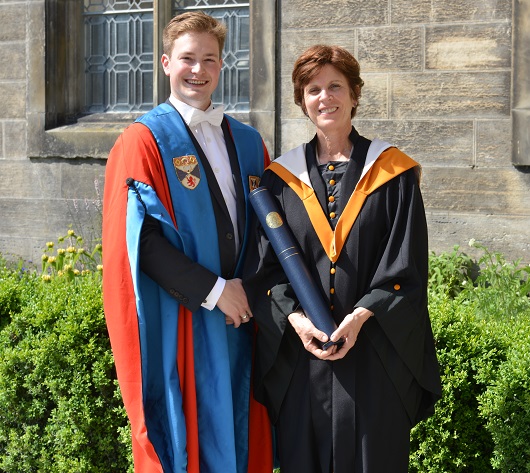Laureation Address: Professor Louise Richardson

Laureation by Patrick Mathewson, President of the Students’ Association, for Professor Louise Richardson FRSE, recipient of the Honorary Degree of Doctor of Letters.
Chancellor, it is my privilege to present for the degree of Doctor of Letters, honoris causa, Professor Louise Richardson.
“Ecce ego, mitte me.”
“Here I am, send me.”
As we gather on days like today, graduation days, in buildings named for old souls we know only in portraits and the yellowed pages of memoirs, it is often that we speak of laboured pursuit, of discipline, and focused endeavour. But rarely do we speak of obstinance, disobedience and insubordination.
“Here I am, send me.”
The world had no grand ambitions for Louise Mary Richardson. Born one of seven children to a modest Catholic family in Tramore, County Waterford, Ireland, aspiration was no more than an accident of birth, and the prospect of achievement belonged to her brothers. In a recent interview, she said: “The assumption that they would do interesting things was always there, whereas the assumption was that I would never do anything other than get married.”
A PhD at Harvard still years away, she attended a convent school where the core curriculum included ironing. She recalls that academic rigour: “We’d start on men’s handkerchiefs and at the end of the year made it up to the collars of men’s shirts.”
But beyond nuns and nuptials there burned an ambition that would carry her throughout her life. In a characteristic disregard for convention, she applied to Trinity College Dublin, then the domain of Protestant students and forbidden by the Catholic Church. She would be only one of a handful of Catholic students. When asked about this road less travelled, she said: “It had an international reputation. It was regarded as being the best and I was very ambitious.”
Trinity would give way to a Rotary Scholarship and a Masters at UCLA, and then a PhD in Government at Harvard. And before landing in the East Neuk to become the University’s first female Principal in its 600-year history, she established herself academically as an international expert in terrorism and administratively as the Executive Dean of Harvard’s Radcliffe institute.
“Ecce ego, mitte me.”
“Here I am, send me.”
This motto belongs to a cherished figure in St Andrews’ history. As you walk out of the ceremony this afternoon, you will find his name affectionately carved above the entrance of this very hall.
For 31 years until his death in 1952, Sir James Irvine served as Principal and Vice-Chancellor. In that time, he expanded the academic programme, restored student numbers, reinstated the residence system, commissioned now iconic buildings such as St Salvator’s Hall and Younger Hall, and sought out the greatest philanthropists of his time, establishing a trans-Atlantic kinship that carries on to this very day. For his works he is often referred to as ‘the second founder of the University’. And just as his name lingers over the door, his legacy no doubt lingers over those who hold the office of Principal.
However, as we stand here today, we can see in her comparatively brief seven years as Principal, Professor Richardson had no less a dramatic impact on the landscape of our University. Her chorus was one of academic excellence, a time that saw St Andrews climb national and international league tables. With equal vigour and vision she devoted herself to a notion of education that extended beyond the classroom, with projects such as a new Students’ Association, Sports Centre and Music Centre. She took aim at some of the most intractable problems facing our society, fighting for gender equality and encouraging the University to lead in the stewardship of our planet through endeavours such as the Guardbridge biomass plant and Kenly windfarm. She launched the 600th Anniversary Campaign, not only yielding unprecedented levels of fundraising and alumni engagement, but raising the profile of the University across the globe.
And later today, at Martyrs Kirk library, the woman for whom the world had no grand ambition, will see her own name inscribed, etched into our seventh century.
And yet, these many works, these accolades of stone and pillars of prestige are a poor expression of what one achieves as a Principal.
As an alumnus famously recalled, one Sunday after chapel, while standing in St Salvator’s Quad, James Irvine took him by the arm for a walk along The Scores. The student was surprised when Irvine asked him not about his chances in his final examinations but the prospect of a professorship far in his future. He added: “St Andrews never forgets its own.”
The student was said to have ‘hidden this flattering secret in his heart for many years’. It was upon actually achieving a professorship at another institution that he revealed to his contemporaries the story of their walk together and Irvine’s perception. He was shocked to discover that each of them had been taken on the same walk.
This is the true work of a Principal, a tireless effort to inspire, to infuse a new generation with a sliver of their own ambition. To look beyond the immediate horizon, beyond the day’s challenges. To do more than the world ever expected of them.
This has been the life’s work of Professor Louise Richardson. That neither sex nor circumstance would prevent a bright enquiring mind from gazing up to a stone and a world yet unmarked, and saying: “I am here, send me.”
St Andrews never forgets of its own.
Chancellor, in recognition of her major contribution to insubordination, obstinance, and all that makes a St Andrean, I invite you to confer the degree of Doctor of Letters, honoris causa, on Professor Louise Richardson.
Category Awards